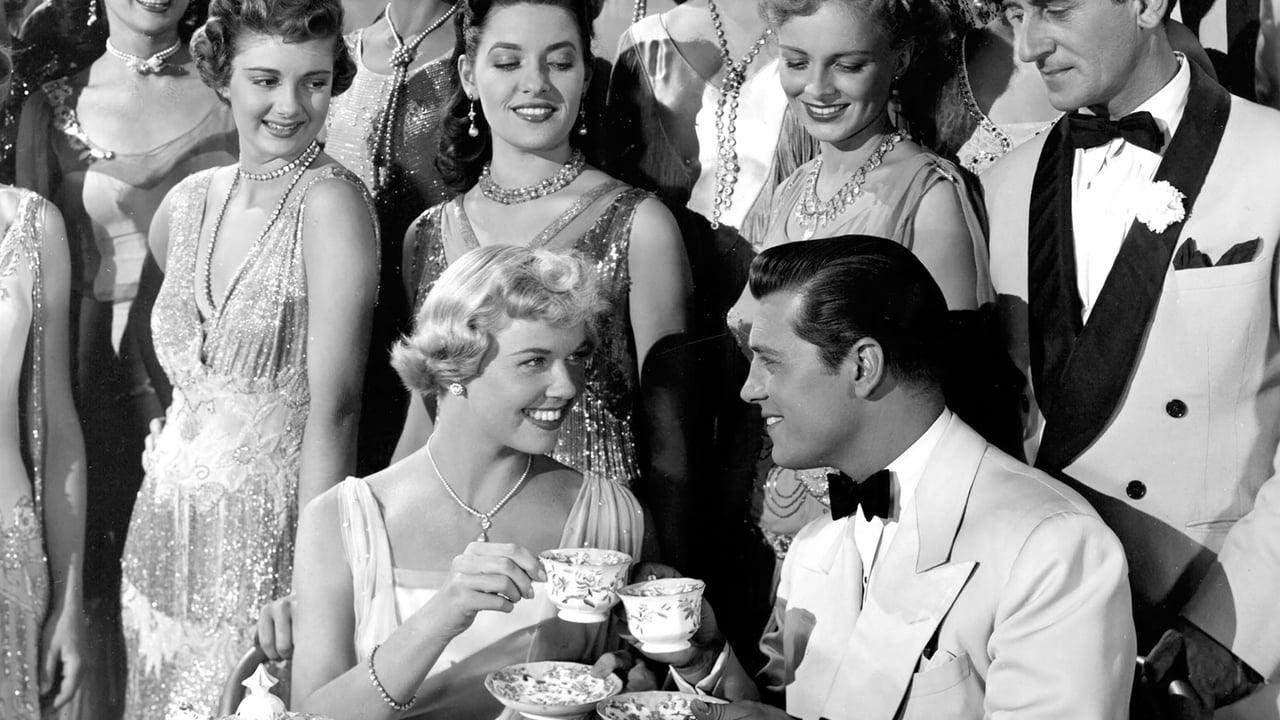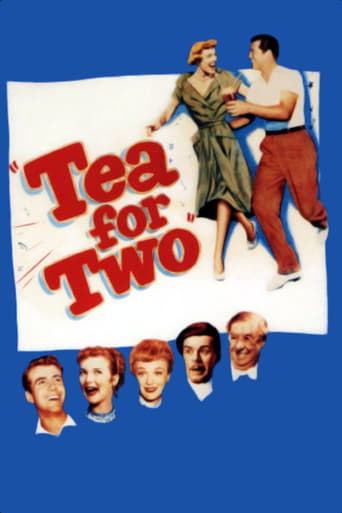

True to its essence, the characters remain on the same line and manage to entertain the viewer, each highlighting their own distinctive qualities or touches.
... View MoreEasily the biggest piece of Right wing non sense propaganda I ever saw.
... View MoreA clunky actioner with a handful of cool moments.
... View MoreI think this is a new genre that they're all sort of working their way through it and haven't got all the kinks worked out yet but it's a genre that works for me.
... View MoreMusical comedy is pleasant to watch like Tea for Two,the plot in interesting and apart Doris Day who is a star the supporting casting is strong enough to hold the picture,S Z Sakall is amazing who are in trouble with the financial problems and Billy the Wolfe is a priceless acting as crook....but the songs is weak really...Gordon MacRae isn't a good enough. But the gags situations is funny and have beauty girls everywhere!!
... View MoreIn "Gold Diggers of 1933", New Yorkers were seen marching in breadlines to the tune of "My Forgotten Man". A list of Broadway theatres showed them to be mostly dark. But in this light-hearted musical, set just after the 1929 crash, there is none of that. Stockbroker S.Z. Sakall watches his niece's millions disappear into the red, not realizing that she (Doris Day) has just agreed to give $25,000 to Broadway producer boyfriend Billy DeWolfe and star in the show. Sakall quickly makes a deal with her-he will give her the money if she will not say "yes" to everything for 48 hours. Easy enough, but Sakall has every intention of making sure she doesn't win the bet. Secretary Eve Arden is assigned to spend the next 48 hours with her, and when she brings the entire cast of the show home to their Long Island estate, Sakall uses every opportunity to get her to utter the forbidden word. During all of this, Day realizes the truth about the vile DeWolfe and falls in love with the handsome leading man, Gordon MacRae.This is not the plot of the 1925 musical "No No Nanette". That was the story of a bible salesman and his wife's efforts to keep an eye on their 18 year old niece Nanette, while she is scheming to flee to Atlantic City for a weekend. The only reference to that show (other than song and character names) is the assumption that the musical DeWolfe is producing is indeed that version of "No No Nanette". Several songs from the musical (which can be heard on the cast recording of the 1971 Broadway revival) are heard, and include "Tea For Two", "I Want to Be Happy", "Call of the Sea", and "No No Nanette". Other songs by other composers from the period of 1925-1935 are heard, including "Do Do Do" (from Gershin's "Oh, Kay!"), "Crazy Rhythm", and "I Only Have Eyes For You" (from Warner's 1934 film "Dames").What you have is an early 50's version of what the depression must have been all about, which is funny considering that most of the creative team of this film were around during that time. Other than the fur coat and flapper dress worn by the children in the opening scene (which leads to the flashback telling of the story), the characters are not made up to look like what photos and films of the depression era showed them to be. The hairstyles are more late 40's than early 30's, and the outfits appear to be closer to post depression era. No matter, the film still remains extremely entertaining, with Day a lovely heroine, MacRae and Gene Nelson delightful as the juveniles, and Eve Arden giving her usually funny sarcastic performance. DeWolfe is funny in a sequence showing hopeful backers what the chorus girls will be doing, but overdoes it a bit in the Charleston scene. Patrice Wymore plays the stereotypical bitchy Bebe Daniels type leading lady.I rank this high because there is a lot of humour and joy to be found throughout. It may not be as lavish as the musicals done over at MGM (where sometimes the musicals seemed a bit "overdone"), and the scenes onstage actually appear to fit in a Broadway theatre. The "Nanette" sequence at the end is a delightful mini-movie of what the original production in 1925 may have looked like, although that was not during the depression.
... View MoreI am normally a very big fan of Doris Day, but this film was certainly not one of her best.The following year's "I'll See You in My Dreams" is so much better, plot-wise, music wise, and especially "acting-wise".Some of the songs are quite enjoyable to hear, however, the production numbers are very "clunkily" staged, and the fact that this film is supposed to be set in late 20's and no attempt is made at authentic period detail (except for the cars) is really quite annoying, and does takeaway from the overall enjoyment of the musical.Not terrible, but definitely not Doris' best.Surprisingly, I have heard that this was one of the biggest "hits" of 1950. Huh??
... View MoreIn her fifth movie, Doris Day finally achieved top-billing, yet she shares the screen equally with a talented ensemble cast, with everyone working hard to inject some sparkle into a wafer-thin concoction. Inspired by the 1920s stage hit "No, No, Nanette" (itself filmed in 1940), this plays out as sort of the backstage story, with Doris betting her wealthy uncle that she won't say 'yes' for 48 hours in exchange for show-money. Unbeknownst to her, uncle S.Z. Sakall has been nearly ruined by the 1929 stock market crash which, incidentally, hasn't kept all the hoofers from hanging up their tap shoes (they're the merriest group of poor, working dancers I've ever seen!). Pleasant tunes, colorful costumes and fun dance routines (including a hair-raising bit with Gene Nelson on a staircase) can't really add excitement to the proceedings, which seems to have been made as a matinée quickie. Day shines (as usual), but her relationships with the men (Nelson, Gordon MacRae, and Billy De Wolf) are unclear, with De Wolf in particular a real wild card (would you believe him as a ladies' man stage producer?). Eve Arden has some funny asides, and the wrap-up is cute, but "Tea for Two" vanishes from the cup just as quickly as it is poured. ** from ****
... View More